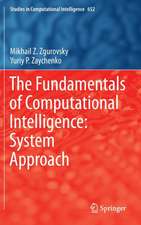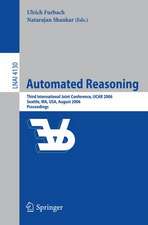Design of Interpretable Fuzzy Systems: Studies in Computational Intelligence, cartea 684
Autor Krzysztof Cpałkaen Limba Engleză Hardback – 9 feb 2017
| Toate formatele și edițiile | Preț | Express |
|---|---|---|
| Paperback (1) | 587.56 lei 38-45 zile | |
| Springer International Publishing – 4 mai 2018 | 587.56 lei 38-45 zile | |
| Hardback (1) | 648.59 lei 6-8 săpt. | |
| Springer International Publishing – 9 feb 2017 | 648.59 lei 6-8 săpt. |
Din seria Studies in Computational Intelligence
- 20%
 Preț: 449.37 lei
Preț: 449.37 lei - 20%
 Preț: 1158.26 lei
Preț: 1158.26 lei - 20%
 Preț: 986.66 lei
Preț: 986.66 lei - 20%
 Preț: 1452.76 lei
Preț: 1452.76 lei - 20%
 Preț: 168.78 lei
Preț: 168.78 lei - 20%
 Preț: 1291.10 lei
Preț: 1291.10 lei - 18%
 Preț: 1112.30 lei
Preț: 1112.30 lei - 20%
 Preț: 565.39 lei
Preț: 565.39 lei - 20%
 Preț: 649.28 lei
Preț: 649.28 lei - 20%
 Preț: 1047.73 lei
Preț: 1047.73 lei - 20%
 Preț: 1578.96 lei
Preț: 1578.96 lei - 20%
 Preț: 643.50 lei
Preț: 643.50 lei - 20%
 Preț: 657.49 lei
Preț: 657.49 lei - 20%
 Preț: 993.28 lei
Preț: 993.28 lei - 20%
 Preț: 990.80 lei
Preț: 990.80 lei - 20%
 Preț: 989.96 lei
Preț: 989.96 lei - 20%
 Preț: 1165.69 lei
Preț: 1165.69 lei - 20%
 Preț: 1444.52 lei
Preț: 1444.52 lei - 20%
 Preț: 1041.96 lei
Preț: 1041.96 lei - 20%
 Preț: 1047.73 lei
Preț: 1047.73 lei - 20%
 Preț: 1046.06 lei
Preț: 1046.06 lei - 18%
 Preț: 2500.50 lei
Preț: 2500.50 lei - 20%
 Preț: 989.13 lei
Preț: 989.13 lei - 20%
 Preț: 1165.69 lei
Preț: 1165.69 lei - 20%
 Preț: 1164.05 lei
Preț: 1164.05 lei - 20%
 Preț: 1042.79 lei
Preț: 1042.79 lei - 20%
 Preț: 1460.19 lei
Preț: 1460.19 lei - 18%
 Preț: 1403.52 lei
Preț: 1403.52 lei - 18%
 Preț: 1124.92 lei
Preț: 1124.92 lei - 20%
 Preț: 1039.47 lei
Preț: 1039.47 lei - 20%
 Preț: 1008.11 lei
Preț: 1008.11 lei - 20%
 Preț: 1045.25 lei
Preț: 1045.25 lei - 20%
 Preț: 1275.42 lei
Preț: 1275.42 lei - 20%
 Preț: 1040.32 lei
Preț: 1040.32 lei - 20%
 Preț: 988.32 lei
Preț: 988.32 lei - 20%
 Preț: 1169.79 lei
Preț: 1169.79 lei - 20%
 Preț: 1162.37 lei
Preț: 1162.37 lei - 20%
 Preț: 1059.26 lei
Preț: 1059.26 lei - 20%
 Preț: 1164.05 lei
Preț: 1164.05 lei - 20%
 Preț: 1166.52 lei
Preț: 1166.52 lei - 20%
 Preț: 1459.38 lei
Preț: 1459.38 lei - 18%
 Preț: 1005.74 lei
Preț: 1005.74 lei - 20%
 Preț: 997.38 lei
Preț: 997.38 lei - 20%
 Preț: 1055.94 lei
Preț: 1055.94 lei - 20%
 Preț: 1284.47 lei
Preț: 1284.47 lei - 20%
 Preț: 994.08 lei
Preț: 994.08 lei - 20%
 Preț: 1048.72 lei
Preț: 1048.72 lei - 20%
 Preț: 1066.02 lei
Preț: 1066.02 lei - 20%
 Preț: 943.78 lei
Preț: 943.78 lei - 20%
 Preț: 1173.10 lei
Preț: 1173.10 lei
Preț: 648.59 lei
Preț vechi: 810.74 lei
-20% Nou
Puncte Express: 973
Preț estimativ în valută:
124.11€ • 132.71$ • 103.48£
124.11€ • 132.71$ • 103.48£
Carte tipărită la comandă
Livrare economică 18 aprilie-02 mai
Preluare comenzi: 021 569.72.76
Specificații
ISBN-13: 9783319528809
ISBN-10: 3319528807
Pagini: 196
Ilustrații: XI, 196 p. 65 illus.
Dimensiuni: 155 x 235 x 13 mm
Greutate: 0.5 kg
Ediția:1st ed. 2017
Editura: Springer International Publishing
Colecția Springer
Seria Studies in Computational Intelligence
Locul publicării:Cham, Switzerland
ISBN-10: 3319528807
Pagini: 196
Ilustrații: XI, 196 p. 65 illus.
Dimensiuni: 155 x 235 x 13 mm
Greutate: 0.5 kg
Ediția:1st ed. 2017
Editura: Springer International Publishing
Colecția Springer
Seria Studies in Computational Intelligence
Locul publicării:Cham, Switzerland
Cuprins
Preface.- Acknowledgements.- Chapter1: Introduction.- Chapter2: Selected topics in fuzzy systems designing.- Chapter3: Introduction to fuzzy system interpretability.- Chapter4: Improving fuzzy systems interpretability by appropriate selection of their structure.- Chapter5: Interpretability of fuzzy systems designed in the process of gradient learning.- Chapter6: Interpretability of fuzzy systems designed in the process of evolutionary learning.- Chapter7: Case study: interpretability of fuzzy systems applied to nonlinear modelling and control.- Chapter8: Case study: interpretability of fuzzy systems applied to identity verification.- Chapter9: Concluding remarks and future perspectives.- Index.
Textul de pe ultima copertă
This book shows that the term “interpretability” goes far beyond the concept of readability of a fuzzy set and fuzzy rules. It focuses on novel and precise operators of aggregation, inference, and defuzzification leading to flexible Mamdani-type and logical-type systems that can achieve the required accuracy using a less complex rule base. The individual chapters describe various aspects of interpretability, including appropriate selection of the structure of a fuzzy system, focusing on improving the interpretability of fuzzy systems designed using both gradient-learning and evolutionary algorithms. It also demonstrates how to eliminate various system components, such as inputs, rules and fuzzy sets, whose reduction does not adversely affect system accuracy. It illustrates the performance of the developed algorithms and methods with commonly used benchmarks. The book provides valuable tools for possible applications in many fields including expert systems, automatic control and robotics.
Caracteristici
Presents insights into the design of interpretable fuzzy systems Is intended primarily for researchers in fuzzy systems and computational intelligence Written by a leading expert in the field Includes supplementary material: sn.pub/extras




























